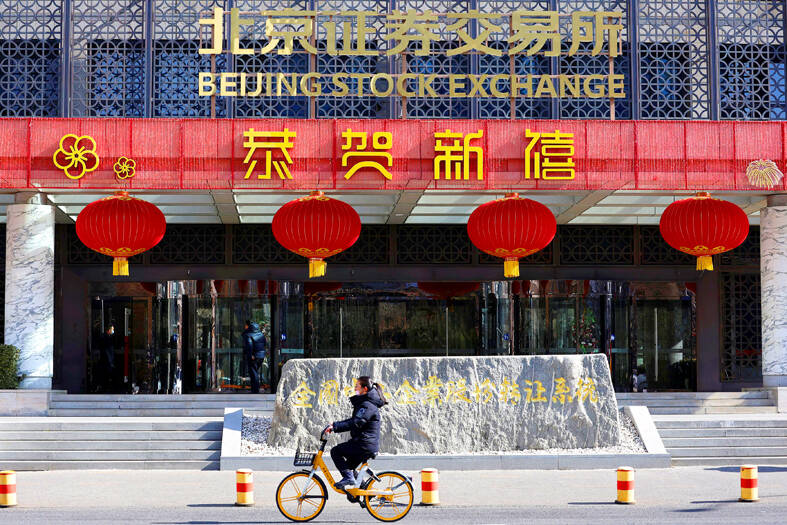MSCI Inc is cutting dozens of Chinese companies from its global benchmarks, after many stocks tumbled as the market erased trillions of dollars in value.
The index provider is removing 66 companies from its MSCI China Index in its latest quarterly review, the highest tally in at least two years.
The changes, effective as of the close on Feb. 29, also apply to the MSCI All Country World Index.

Photo: Reuters
Stocks to be cut include property developers Gemdale Corp (金地) and Greentown China Holdings Ltd (綠城中國), as well as China Southern Airlines Co (中國南方航空) and Ping An Healthcare and Technology Co (平安健康互聯網).
The removals come as China’s weighting in global portfolios slumps amid worries about its struggling property sector and weak consumption, and as alternatives such as India become more prominent.
In a sign of the deep pessimism about the China and Hong Kong stock markets, equity rallies spurred by a slew of policy support measures last week faded within a few sessions ahead of the Lunar New Year break.
“It highlights the issue of negative flows for Chinese stocks as investors reduce exposure to the country, in large part due to recent weak fundamentals, but also fears of ongoing financial instability, regulatory uncertainty, and — most of all — country risk,” Capital.Com Inc senior analyst Kyle Rodda said.
“Some investors may also be forced to liquidate because of losses already incurred or because certain companies no longer fall within investment mandates,” he added.
Three stocks are to be deleted from the Hong Kong index as well: Budweiser Brewing Co APAC Ltd, New World Development Co (新世界發展) and Xinyi Glass Holdings Ltd (信義玻璃控股).
Index-hugging funds will have to purge these stocks from their portfolios. There is at least US$5.9 billion in exchange-traded funds tracking the MSCI China Index, the largest of which is the US-listed iShares MSCI China ETF, according to Bloomberg-compiled data.
The news was not all about cuts, though. Five components are to be added to the MSCI China Index, including electrical-appliance maker Midea Group Co (美的集團) and skin-treatment company Giant Biogene Holding Co (巨子生物).
Still, the high number of deletions could weigh as Hong Kong resumes trading today. MSCI takes a number of factors into account for including stocks in its standard indices including market capitalization, free float and extreme price increases.
“The deletion list of Chinese companies, spanning across a wide range of sectors from technology, property and retail to healthcare, solidifies the perception of systemic-based concerns over the world’s second-largest economy,” IG Markets Ltd analyst Hebe Chen (陳碧菲) said.

In Italy’s storied gold-making hubs, jewelers are reworking their designs to trim gold content as they race to blunt the effect of record prices and appeal to shoppers watching their budgets. Gold prices hit a record high on Thursday, surging near US$5,600 an ounce, more than double a year ago as geopolitical concerns and jitters over trade pushed investors toward the safe-haven asset. The rally is putting undue pressure on small artisans as they face mounting demands from customers, including international brands, to produce cheaper items, from signature pieces to wedding rings, according to interviews with four independent jewelers in Italy’s main

Japanese Prime Minister Sanae Takaichi has talked up the benefits of a weaker yen in a campaign speech, adopting a tone at odds with her finance ministry, which has refused to rule out any options to counter excessive foreign exchange volatility. Takaichi later softened her stance, saying she did not have a preference for the yen’s direction. “People say the weak yen is bad right now, but for export industries, it’s a major opportunity,” Takaichi said on Saturday at a rally for Liberal Democratic Party candidate Daishiro Yamagiwa in Kanagawa Prefecture ahead of a snap election on Sunday. “Whether it’s selling food or

CONCERNS: Tech companies investing in AI businesses that purchase their products have raised questions among investors that they are artificially propping up demand Nvidia Corp chief executive officer Jensen Huang (黃仁勳) on Saturday said that the company would be participating in OpenAI’s latest funding round, describing it as potentially “the largest investment we’ve ever made.” “We will invest a great deal of money,” Huang told reporters while visiting Taipei. “I believe in OpenAI. The work that they do is incredible. They’re one of the most consequential companies of our time.” Huang did not say exactly how much Nvidia might contribute, but described the investment as “huge.” “Let Sam announce how much he’s going to raise — it’s for him to decide,” Huang said, referring to OpenAI

The global server market is expected to grow 12.8 percent annually this year, with artificial intelligence (AI) servers projected to account for 16.5 percent, driven by continued investment in AI infrastructure by major cloud service providers (CSPs), market researcher TrendForce Corp (集邦科技) said yesterday. Global AI server shipments this year are expected to increase 28 percent year-on-year to more than 2.7 million units, driven by sustained demand from CSPs and government sovereign cloud projects, TrendForce analyst Frank Kung (龔明德) told the Taipei Times. Demand for GPU-based AI servers, including Nvidia Corp’s GB and Vera Rubin rack systems, is expected to remain high,